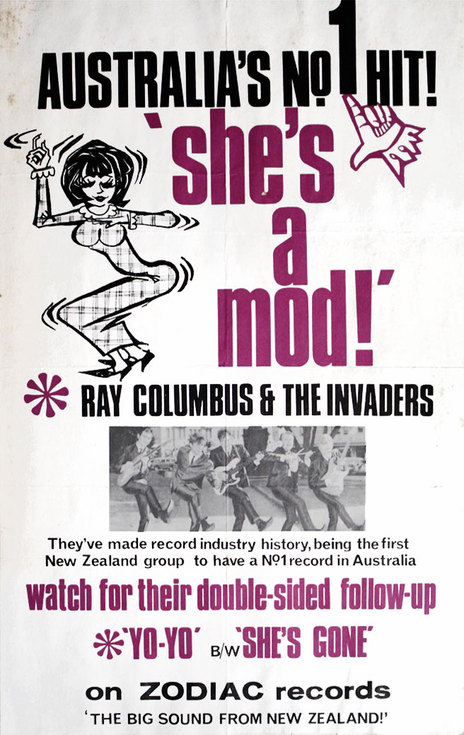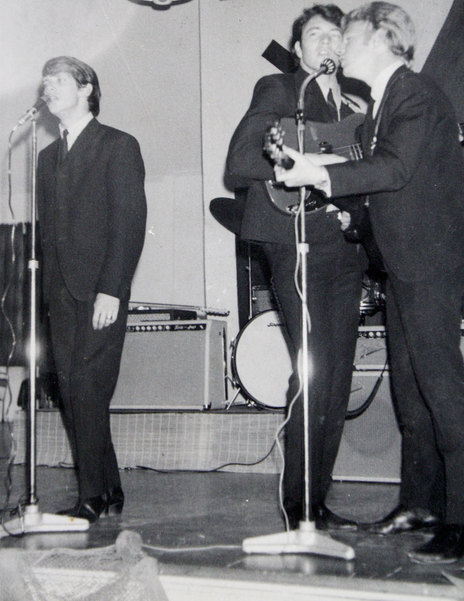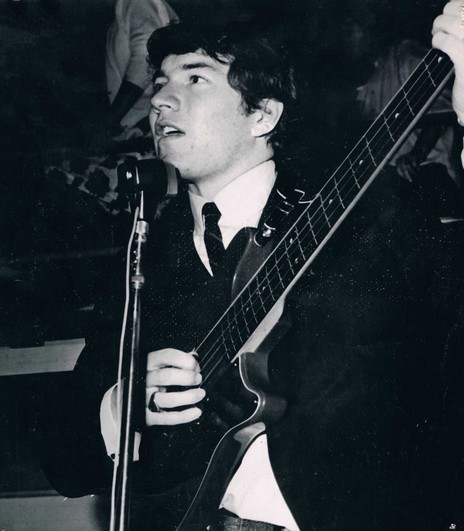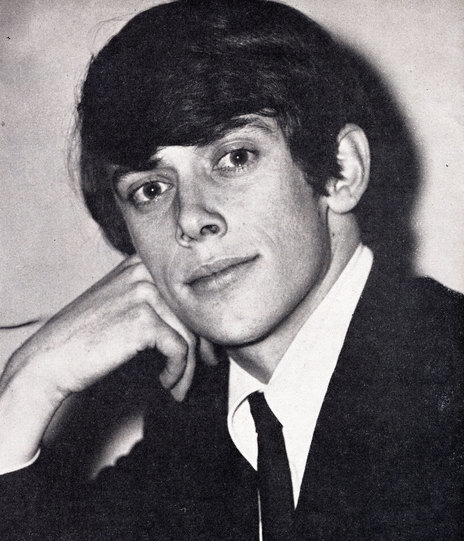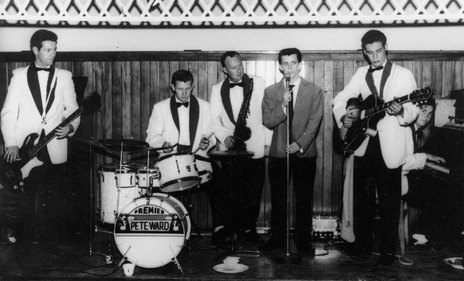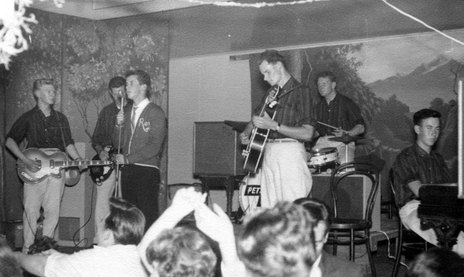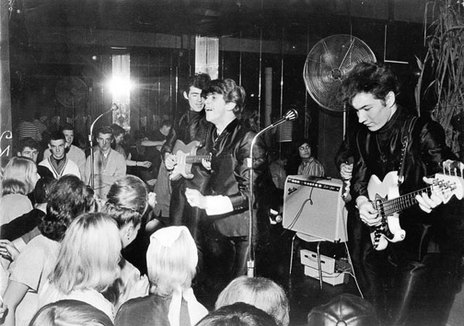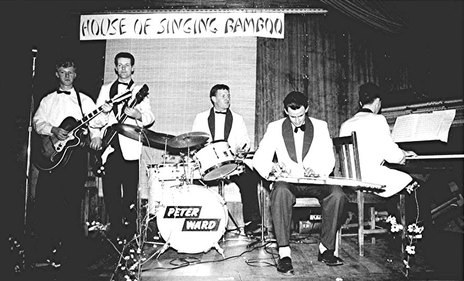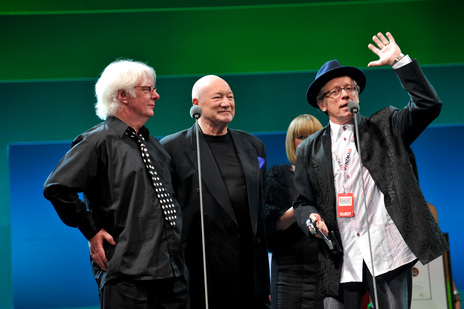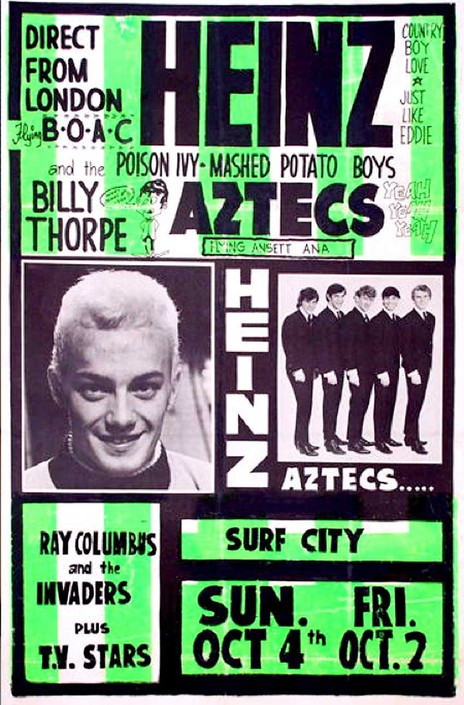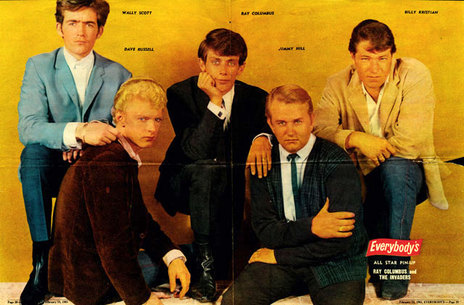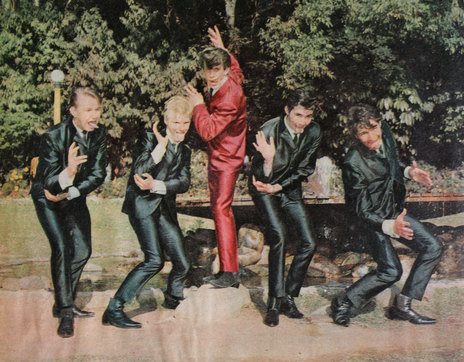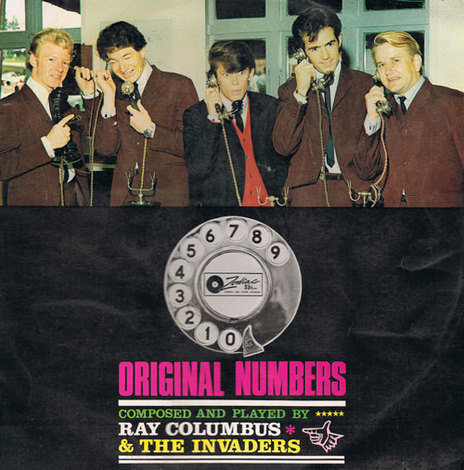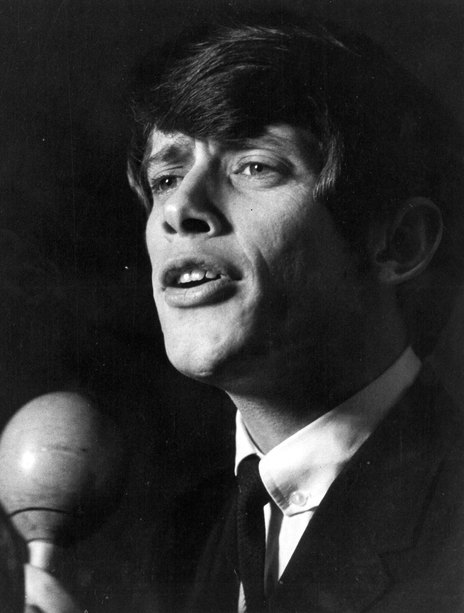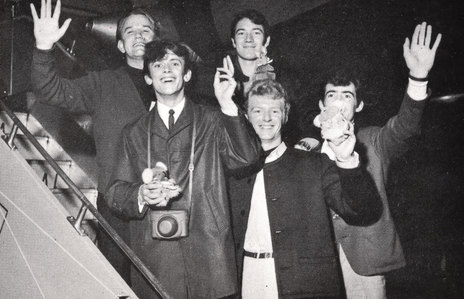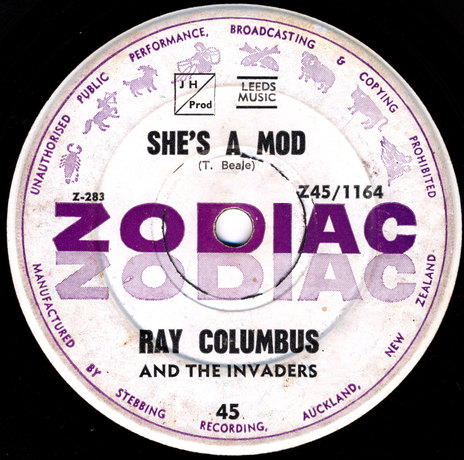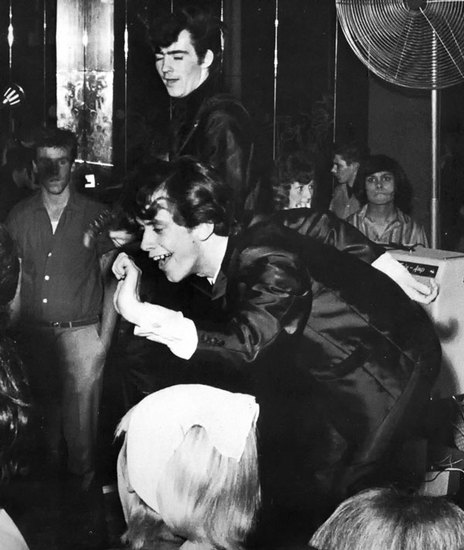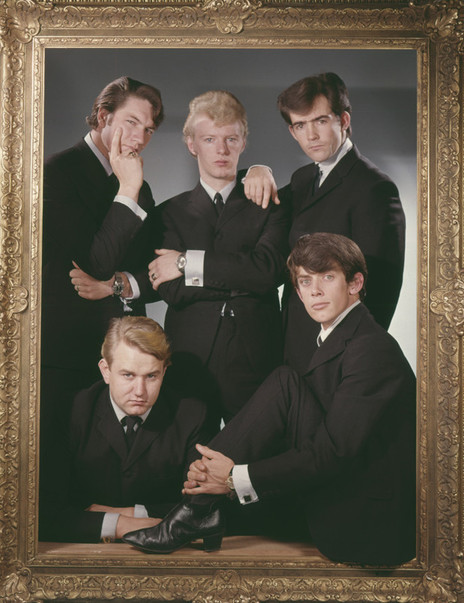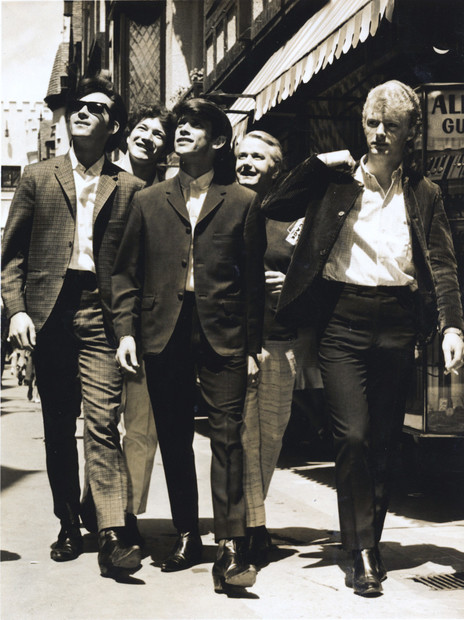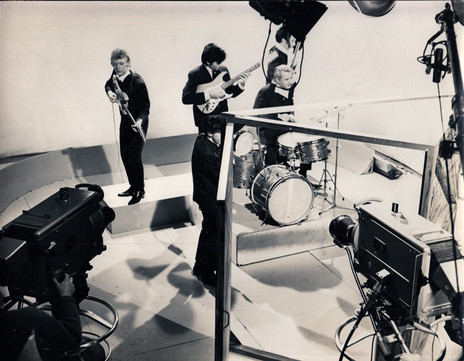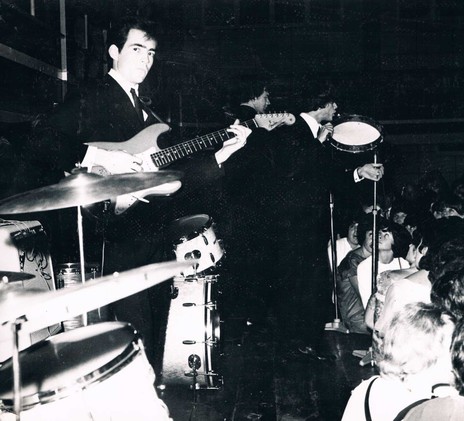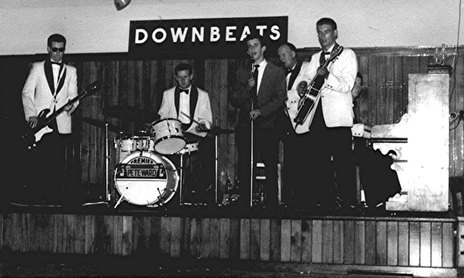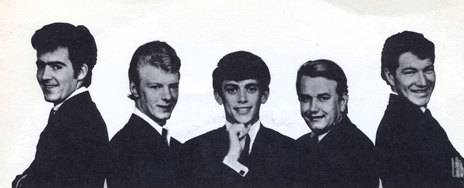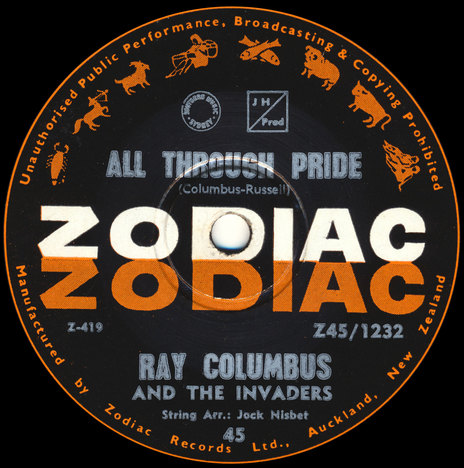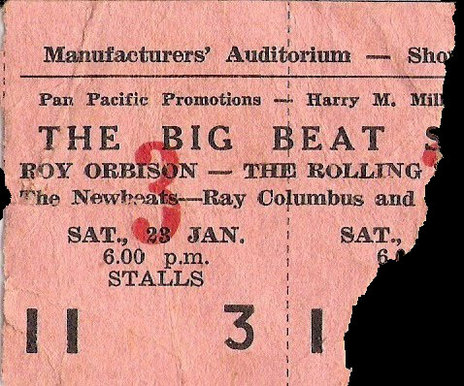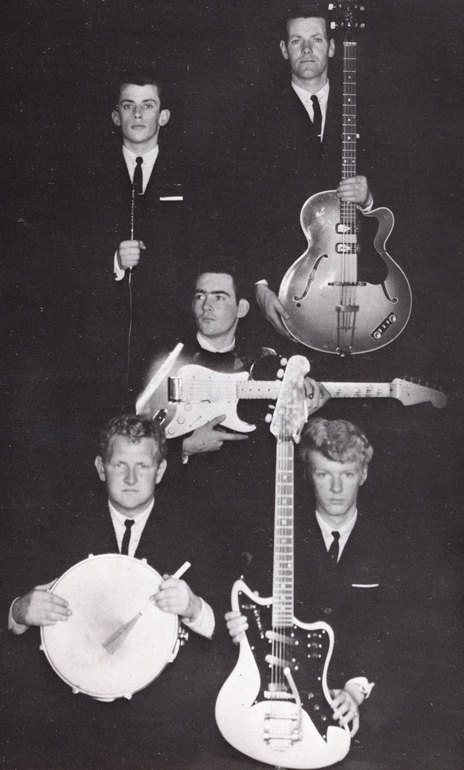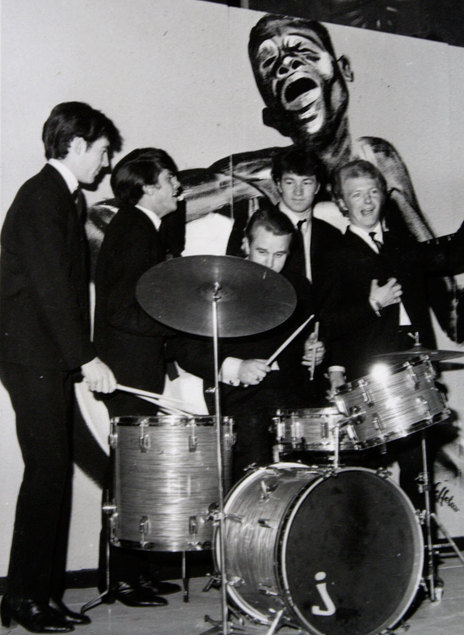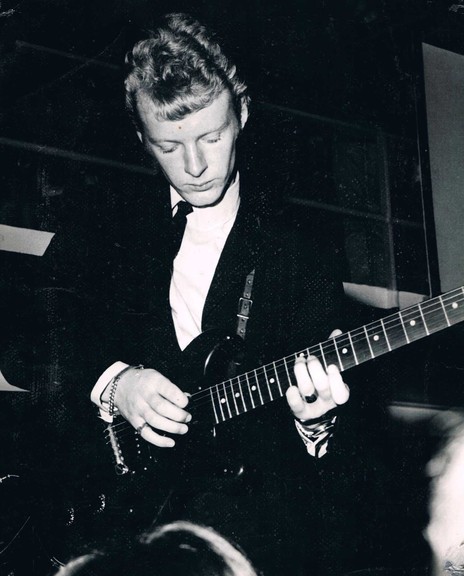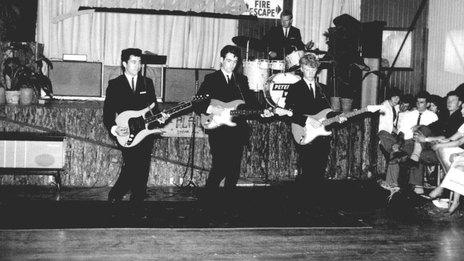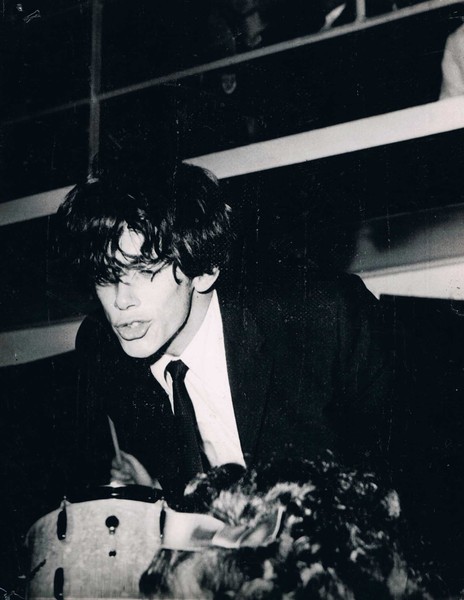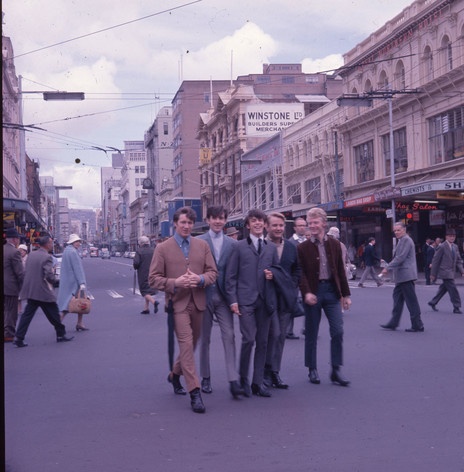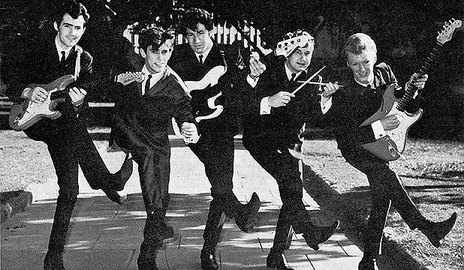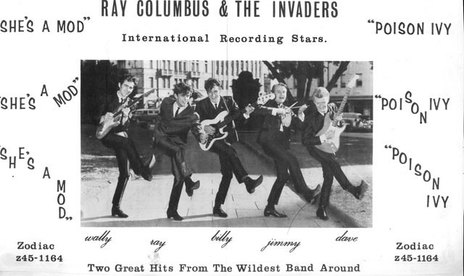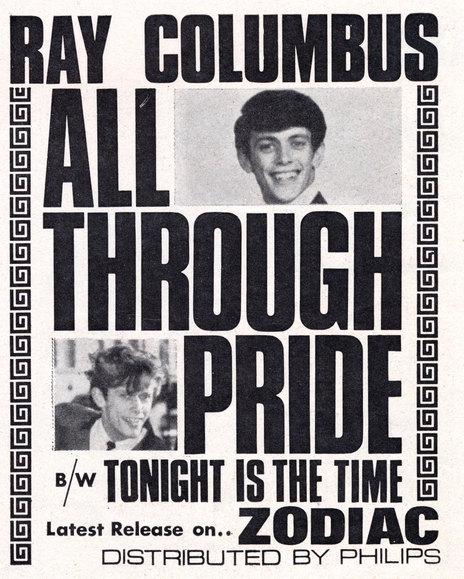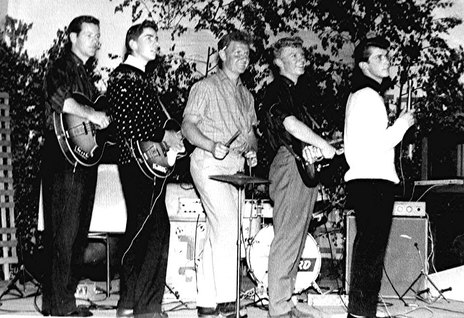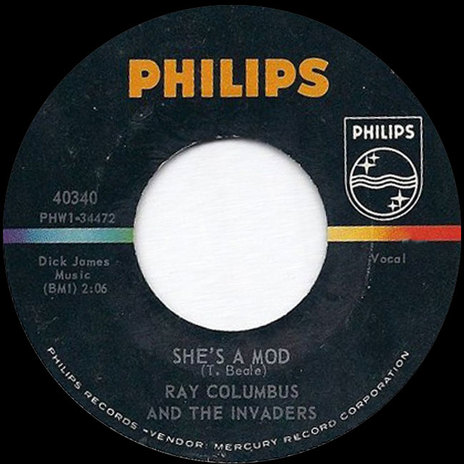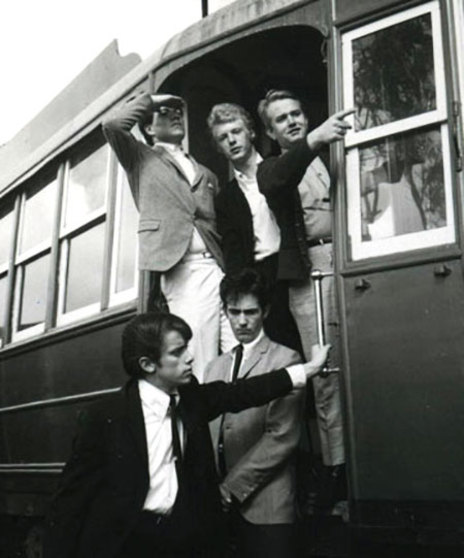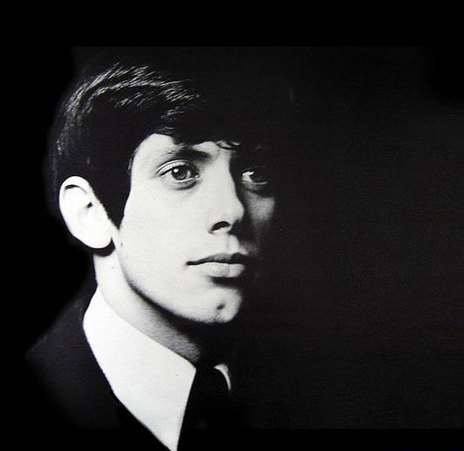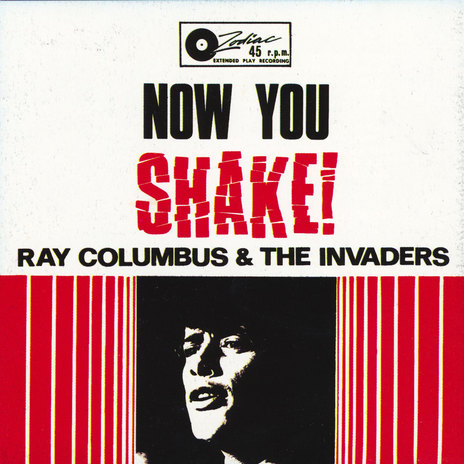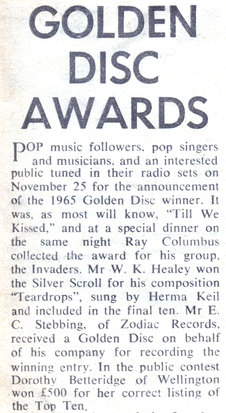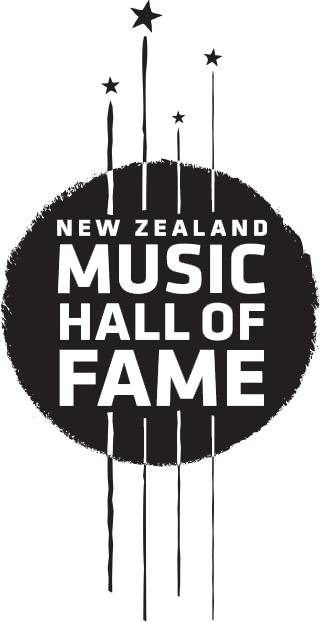Ray was the first to join, getting his chance to audition one night after being tipped off that their singer might be a no-show. Ray was ready to impress with a Cliff Richard song or two. He got the job.
The Downbeats’ guitarist Tony Athfield soon chose to leave the band and settle down. He suggested that his star pupil, 14-year-old Dave Russell, was the man for the job. The young guitarist arrived at the audition in his school uniform, but he intuitively shook up Jerry Lee Lewis’s ‘Whole Lotta Shakin’ Going On’ and got the job.
“He just blew my socks off, playing all these rock riffs and blues riffs. I said, ‘Where did you get those from?’ He was very shy. He said, ‘I just picked them up.’ He instinctively could do all the Chuck Berry stuff,” Columbus recalled in 2001.
The stylish 16-year-old Ray Columbus also impressed the young guitarist. Dave Russell told the NZ Herald (Oct 8, 2009), “Ray was a few years older than me. He was the singer in a real band and I was still at school. In teen-terms, Ray was an old guy. He was as professional then as he is now. I was impressed.”
at the DEEP FREEZE base in Christchurch, bands heard american R&B
By late 1961, all the former member of the original Downbeats dance band had departed and the younger players briefly changed their name to Ray and The Drifters. The new guitarist Brian Ringrose joined the instrumental line-up of Dave Russell (guitar), Mac Jamieson (bass) and Peter Ward (drums).
In 1961 Ray Columbus had performed solo on the local television station CHTV3 show Time Out for Talent. With an ego – big enough for TV – he was asked by the TV producer John Nash to host a four-show series Club Columbus that also featured the band. Nash wanted the band to change their name for the new show.
In 2009, Dave Russell recalled, “We originally came up with Ray Columbus and The Discoverers, as in Christopher Columbus. We decided the name should be a little tougher and changed it to The Invaders.” The half-hour show, Club Columbus was broadcast in Christchurch in February 1962 and was then distributed to the NZBC TV stations in Auckland, Wellington and Dunedin.
I did a lengthy interview with Ray Columbus for Real Groove magazine’s April 2001 issue. “In our transition period from The Downbeats into The Invaders, we became more and more pop/R&B, the music was danceable and that was what I particularly loved to do with the group,” said Columbus. “The songs we wrote like ‘Yo Yo’ and ‘Now You Shake’ reflected that.”
While The Beatles were getting a dose of American R&B in the shipping ports of Hamburg and their hometown of Liverpool, Christchurch bands were regularly playing the local USA military base’s Enlisted Men’s Club and being exposed to the latest imported USA R&B on the jukebox. Bands fronted by Ray Columbus or Max Merritt were the most popular at the Operation Deep Freeze base.
“When we had our break from playing, all the young guys – who were slightly older than us – would start playing the jukebox and we’d hear stuff like James Brown. These black guys would get on the floor and start doing dances like the mashed potato,” Columbus recalled. “Being an ex-tap dancer I was able to learn the dances.”
When Rolling Stones drummer Charlie Watts asked Ray where he got his moves from, Ray told him about the USA military base jukebox and then asked Charlie where Mick got his moves from. Watts succinctly replied, “He copied James Brown.”
In 1962 the band moved to a regular full-time gig at inner city venue the Plainsman. “We did the floorshow two times a night. The Plainsman catered for USA servicemen coming in with their dates. All they got was toasted sandwiches and bad coffee, but they would bring along their little bottles, I’m sure!”
When Howard Morrison dropped by the Plainsman, after his show at the Majestic Theatre, he came backstage and said, “You have got to get this show to Auckland. You’ll kill them!” (The Modfather, Penguin 2011.)
Visiting promoter Dave Dunningham was also keen for The Invaders to do six weeks of work in Auckland. They took up his offer, but Invaders guitarist Brian Ringrose was still at secondary school and his parents would not allow him to travel to Auckland, so Wally Scott took his place. As the band needed a bassist who could learn new songs faster – Mac Jamieson was replaced by Puni Solomon.
What the Invaders didn’t learn about cool from black USA servicemen they learnt from a Jive dancer. “We were fortunate to have a fabulous manager called Johnny Johnson for six months,” Columbus enthused. “He came to Auckland with us when we first caused a bit of a stir, Christmas 1962. This guy was the coolest guy. He was a Jive champion, a jazz-bohemian, not a beatnik. He was real slick, wore beautiful sharkskin suits – a real style guy. He was fantastic!”
IN Auckland, the invaders found out that they were a step ahead of the competition
Columbus thought that they might learn a thing or two from Auckland bands. They soon found out that they were a sizeable step ahead of the competition. When Eldred Stebbing wanted to sign The Invaders to Zodiac early in the New Year of 1963, Columbus recalled, “Johnny Johnson said, ‘You’ll have to change the name of the label!’ He didn’t like it!”
“When we left Auckland, we had eight promoters, including Phil Warren, wanting us to return on a full year’s contract. Johnny Johnson told them all to meet us at NAC [state-owned domestic airline National Airways Corporation] to see us off on the Sunday morning after we’d finished our month’s stint. They all arrived. You’ve got Dave Dunningham and Phil Warren and all these guys standing there with their offers in writing. Johnny goes around and goes ‘Thank you!’ ‘Thank you!’ ‘Thank you!’ ‘We’ll be in touch!’ That was early 1963 and the guy had such style and business nous, he showed all of those people that they were all wanting us, and so they’d better have a good business deal. You don’t forget things like that and he wasn’t arrogant, he was just sharp.”
But the band’s manager was about to be married and his wife wanted him to quit the music scene. Johnson suggested to Columbus that he manage the group. Columbus recalled their conversation – “I said, ‘No I’m the lead singer, I’m the main songwriter, I have to really force the guys to even write with me!’ He said, ‘Doesn’t matter. You understand the business. If you can’t find someone else, you do it.' So I had to take it over. I looked for a long time. I couldn’t find anybody.”
When the band returned to Auckland to live, Jimmy Hill replaced Peter Ward on drums.
Eldred Stebbing and Columbus were a great combination – both were born creative entrepreneurs with ambition. Stebbing had business acumen and Columbus had youthful naïveté. The group’s trans-Tasman success was in the grooves and the entrepreneurial flair.
New Zealand recorded some excellent pop hits in the 1960s. Eldred Stebbing made some of the best singles in the basement of his Saratoga Avenue house in Herne Bay, Auckland.
Eldred Stebbing gained an experienced recording engineer from the UK in 1964. I spoke to Stebbing for a Real Groove magazine story in March 2001. “I had John Hawkins come into the picture about 1964 and he’d had quite a lot of experience, he’d worked in England with Joe Meek. He was with Pye in England and also did a lot of Petula Clark. He was with us three or four years.”
Stebbing provided a creative environment for The Invaders to record, allowing them to approve the final acetate and revisit a track if they were not happy with what was in the grooves. For Columbus, the direction behind The Invaders’ hit recordings came from the band, not the label.
“What The Invaders sounded like really was an Invaders thing, not a producer thing because John Hawkins for us, was never our producer,” Columbus said. “That was what the record company said he was, but he was a very good internationally trained engineer.”
The group’s first single for Zodiac was released in April 1963. The Columbus/Russell compositions ‘Money Lover’/‘So In Love’ failed to gain airplay. Stebbing suggested a cover of the instrumental ‘Ku Pow’ for their next single and that was followed by their take on The Beatles’ ‘I Wanna Be Your Man’.
“The NZBC told us that if we wanted to get played, to do covers” – Ray Columbus
In 1986 Columbus talked to Bryan Staff (ChaCha magazine June 1986) about getting the big no at radio. “The NZBC told us that if we wanted to get played, to do covers. So we did The Beatles’ composition ‘I Wanna Be Your Man’. I’ve been an entertainer since I was six – the show must go on – so we said ‘Alright, we’ll do covers, but we’ll do them great!’”
“Although we were never given credit, The Invaders and I, particularly guitarist Dave Russell and I, had final say on everything that we recorded,” said Columbus. “After the first couple of records that didn’t do anything we took control. Tracks like ‘She’s a Mod’ the sounds were what we gave to the record. John Hawkins recorded it and there wasn’t a great deal to mix in those 2-track days.”
In an era when some UK producers budgeted only one day to record an album, The Invaders were allowed to return to the Zodiac studio repeatedly to get a single right. Billy Kristian refers to their process in The Definitive Collection sleeve notes: “We went into the Stebbing’s studio and cut our own demo of ‘She’s A Mod’ and took it back home to dissect it. We went back a few days later and nailed it by speeding it up and throwing a lot of guitars into it.”
With Hawkins running the Zodiac studio, Stebbing was able to participate in the Australian invasion. In one 12-month period, Stebbing visited Australia 11 times. It was the singer who took the first initiative. He recalled, “I was listening to 2SM one night – because you could pick up Aussie radio at midnight here once local radio went off the air – and I heard them playing our track ‘Ku Pow’ and they thought it was a European surf group. They were raving about it, so we went over to Sydney.”
Even though Billy Kristian (aka Billy Karaitiana) had played with Columbus in their early teens, his regular gig was with rival Max Merritt. Kristian joined The Invaders in 1963 prior to their Sydney trip after bassist Puni Solomon was fired for getting into trouble at the Shiralee. When they got to Sydney in November 1963, they had recorded their debut album Every Nite and their new single ‘I Wanna Be Your Man’.
“Eldred put up the money. Zodiac was probably the first company to actually pay advances, although they were not called that in those days. He advanced the money to pay for the air travel and accommodation until we started working, and making money. The first gig at legendary Kings Cross venue, Surf City we played for free. Eldred worked hard on the venue manager John Harrigan for that.”
“I had a very big fight to get work for Ray Columbus,” recalled Stebbing. “I used to pester John Harrigan who ran Surf City, every day. He’d say, ‘I’ve got 35 bands on my books, I don’t want them!’ One Saturday, someone was sick and he rang me up and said, ‘I tell you what, I’ll audition them – I’m not paying them for Saturday afternoon – they can do four hours.’ I got every DJ around and I got Brian Henderson of Bandstand TV show up to hear them, I got everybody that was of any note, newspapers, everything. I got them all there and in a lot of cases paid to get them in but that was neither here nor there and they went straight on to Bandstand the next week and they never looked back.”
In Sydney they invented the “Mod’s Nod” dance and they were offered a song called ‘She’s A Mod’
In February 1964 the group returned to NZ with ‘I Wanna Be Your Man’ in the Australian Top 40. In Sydney they’d started their own dance craze, the “Mod’s Nod”. It caught the attention of song publisher Jack Argent at Leeds Music who gave them a demo of the song ‘She’s A Mod’. Terry Beal of the Birmingham group, The Senators, wrote the song. They released their version in February 1964. The band was notable for having John Bonham, later of Led Zeppelin, on drums.
In June 1964 ‘She’s A Mod’ with its Beatlesque “Yeah Yeah Yeah” was released in New Zealand, just prior to The Beatles tour. There was no room on Beatles-mad New Zealand radio, but the song took off in Australia and New Zealand sales followed. In that era, sales charts were state by state, but it reached No.1 in enough states to be deemed an Australian No.1 single.
The first big Australian tour The Invaders did was in 1964. Harry M. Miller’s Starlift 64 also included The Searchers, Del Shannon, Peter & Gordon, Eden Kane and Dinah Lee. The Invaders also backed Del Shannon, Dinah Lee and Eden Kane.
Columbus told Grant Gillanders, “Del Shannon loved The Invaders so much he wanted to take them back to the States, as his backing band – minus me of course.”
Dave Russell recalled their days of touring the great Australian continent: “We had this Holden and trailer to get us from town to town. We were driving through Wop Wop Valley and Ray said to Jimmy, ‘Are they your drums bouncing along the road beside us?’ and Jimmy replied, ‘Dunno, are they Ludwig?’”
“Yeah, we got to the next town and telegraphed Eldred to wire through some money for a new kit, which he did, he was very good like that,” Jimmy Hill told Grant Gillanders in 1994.
Breaking Australia was not without a cost for Columbus when touring and his honeymoon clashed. Ray’s relationship with Zodiac and his new wife L'Vonne would never be the same again.
“The Stebbings did not want me to take my bride over to Australia to join the band because it would ruin our careers. I’d paid for her ticket and given it, and they withheld the ticket. They were protecting their investment and the group I suppose, but my marriage probably never recovered although it lasted 20 years.
“After the Searchers, we went on the road for a six week tour co-headlining with Billy Thorpe and the Aztecs. We were sharing the billing and we were all good friends. We used to flat together. Their manager John [Surf City] Harrigan wanted to manage The Invaders. I refused to sign his contract and when we went to board this big DC6 in Perth he wouldn’t let us on the plane and said, ‘You’ve got no tickets!’ So Billy Kristian and Wally Scott, both being students of martial arts, started to pull some muscle and we got as far as Adelaide and we were stranded there. They left without us. After that incident I used to have a saying, ‘I won’t go to the toilet without return tickets’ because, I learned the hard way.”
“I didn’t call Eldred, he’d already funded new amplifiers for the guys as advances against royalties. I called Harry M. Miller who also wanted to manage us. He said, ‘Ray, where are you?’ I said, ‘Harrigan has stranded us in Adelaide.’ He thought it was very funny! He said, ‘Go to this travel agent, tickets will be waiting. I’ll send you back to Auckland, you owe me one!’ He said, ‘I’ve got a big tour next year and I want a really good deal! It’s with the Stones.’ I said, ‘Harry we’d love to tour with the Stones.’ ”
“In 1965 we did the Stones tour of Australia and New Zealand, it was 52 concerts, a bit bigger than the Searchers tour, we got a fair fee and we stayed in first class accommodation with all of the stars on the bill.”
In a 1986 interview Columbus said, “Of course we had to do it for peanuts, but we owed him one.” Billy Kristian recently said, “I would have paid them to be on that tour.”
In 1965, on a good night, The Invaders may have had more original compositions in their set than the headliners
When The Rolling Stones toured in 1965 they were still playing cover versions of blues and R&B songs. The only set list I have seen from 1965 has only one original, their first self-written single ‘Heart Of Stone’, in the eight-song set. A year later on their 1966 Australian tour they had a half original set including ‘Satisfaction’, ‘19th Nervous Breakdown’ and ‘Get Off My Cloud’. In 1965, on a good night, The Invaders may have had more original compositions in their set than the headliners.
The tour line-up also included Roy Orbison, The Newbeats ('Bread And Butter') and local additions in each city. The first concert was in Sydney January 22, 1965. The tour group arrived in Christchurch Sunday Jan 31 and did TV and radio interviews. Concerts were Mon Feb 1 Theatre Royal, Christchurch (2 shows); Tues Feb 2 Civic Theatre, Invercargill (2 shows); Wed Feb 3 Dunedin Town Hall (2 shows); Sat Feb 6 Auckland Town Hall (3 shows); Mon Feb 8 Wellington Town Hall (3 shows). The final Australian show was Perth on February 13.
As Ray Columbus and The Invaders triumphantly toured with their heroes, through the two countries where they had massive hits of their own, the question was “Where to next?”
The USA was where Columbus wanted to go, but attempts to get visas for the group to live and work in the USA were unsuccessful. Columbus would not consider moving to the UK or Australia. In 2011 he compared a move to London with, “Taking Chow Mein to China.”
The Invaders rhythm section of Billy Kristian and Jimmy Hill wanted the band to be based in Sydney. After sessions for the band’s second album of 100% original compositions, Original Numbers, they left the group to join Max Merritt and The Meteors in Sydney.
Columbus told the NZ Herald (Oct 8, 2009), “The [USA] consular general said, ‘We need teachers and nurses, not musicians.’ When Billy and Jimmy decided to leave the band and go to Australia, because they thought they could make more money, I wasn't even vaguely interested.”
Columbus knew he could get a Green Card to work in the USA, as his wife’s father was an American Serviceman, but he wanted to take the band that he was known to describe as the “greatest band in the world.”
The year that started with The Rolling Stones tour ended with their final cover version, ‘Till We Kissed’, winning the first Loxene Gold Disc Award. The single was the band’s biggest selling New Zealand hit, selling over 50,000 singles.
This single is one of the finest recordings made at Zodiac’s Herne Bay basement studio. “We had to put the tympani drums in the garage because we couldn’t get them through the studio doorway,” recalled Eldred Stebbing. “It wasn’t wide enough.”
‘Till we Kissed’, the whole arrangement that was in my head, I based it on the Righteous Brothers, said Columbus. “In those days even the biggest hits were lucky to be played on the radio more than five or six times a week at certain times, on the Hit Parade or the listeners request session. So if you wanted to hear a record, you had to buy it.”
After the demise of The Invaders, Dave Russell continued to work with the solo Ray Columbus as guitarist and bandleader, and he also joined Max Merritt and The Meteors, although not until 1970, well after Kristian and Hill’s time.
Jimmy Hill only stayed in Sydney for six months before he returned to New Zealand to work with The Keil Isles and once again backed Columbus, as the drummer in the C’mon show band along with Billy Kristian, who had also quit The Meteors.
In the early 1970s Hill drummed and contributed original songs (“Love is Bigger Than The Whole Wide World”) in Headband with Tommy Adderley.
Billy Kristian followed Jimmy Hill to Headband in 1971, and later in the decade he played in Chris Thompson’s band Night, who had two Top 20 USA hit singles in 1979.
Wally Scott moved to Australia to work and died of cancer in 1980. Jimmy Hill died of heart failure, November 7, 2000 in Gosford Hospital, Australia.
When Ray Columbus And The Invaders were honoured at the 2009 NZ Music Awards, Dave Russell, Billy Kristian and Columbus attended and The Mint Chicks performed ‘She’s A Mod’. They were presented with the Legacy Award by the “other” successful NZ mod export, Dinah Lee and inducted into the New Zealand Music Hall of Fame.
Ray Columbus died 29 November 2016. One of our true pioneers and household names, his impact and influence within the New Zealand music industry and community is immeasurable.
--
Read profile on Ray Columbus here
Read Columbus Invades America here
Read Ray Columbus and the Rolling Stones here
Read The Mod's Nod here
